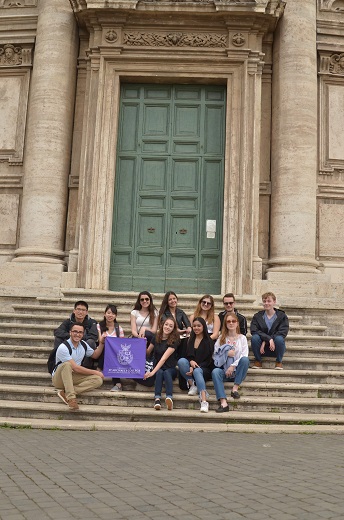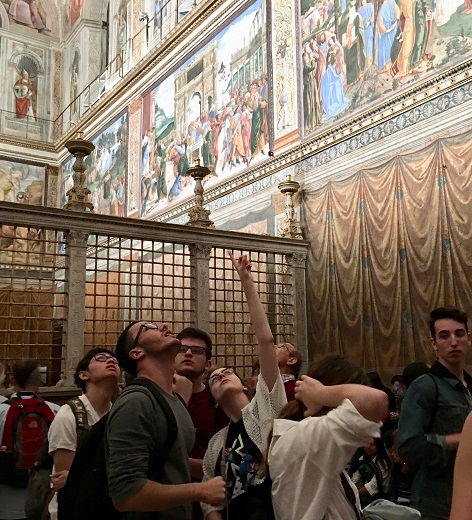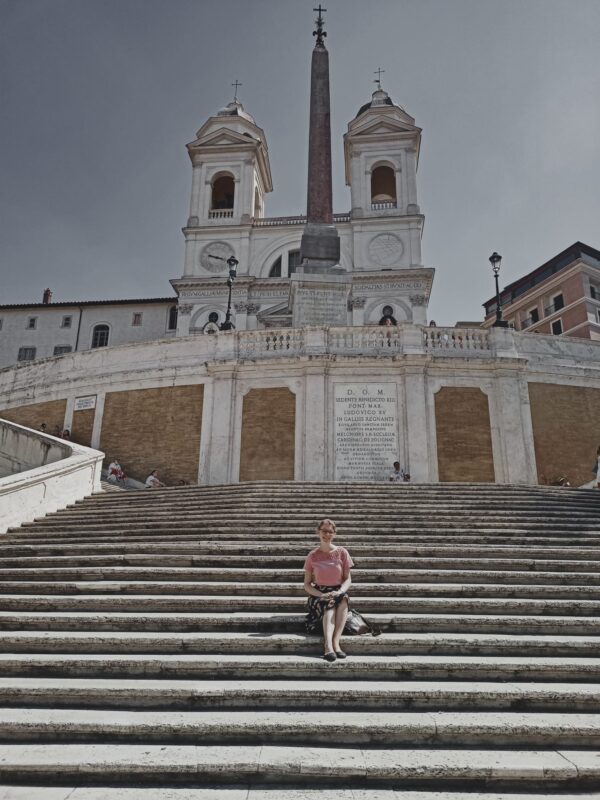Rachel Ottenbreit is a St. Mike’s alumna and former staff member, and is currently studying theology at the Pontifical University of the Holy Cross in Rome.
Doubling Our Joys and Halving Our Sorrows
In Italy, the lockdown began in March. Things closed fast, and although it felt like a total shutdown from the beginning, every week brought new restrictions. Parks, schools, churches, and businesses were closed; travel, group meetings, and “playing” (not ironic quotes: that’s the word the ordinance used) were banned; we could leave our houses only for emergencies, and then alone and with a paper justifying what we were doing on the street. Jane Austen might have said we were “in the middle before we knew we’d begun,” and Shakespeare that “there are more kinds of lockdown and quarantine, Horatio…”
The consequences of these closures are so varied. Surprisingly there were unexpected joys. Yes, although dolphins may or may not have returned to the canals of Venice (reports vary and I didn’t see it myself), those canals are definitely clearer and wildlife have been exploring our cleaner, quieter world. Joys erupted on a personal level too. I got to watch my aunt’s wedding in June and one of my best friend’s this last week. I couldn’t have flown home for either, so those live streams were pure, unexpected gifts.
In Diary of a Country Priest, Georges Bernanos writes that soldiers at the front cannot desert: “A chest is a chest when you get to the trenches. And one less counts!” That is, in the trenches you can literally take hits for others. Once you’re there, whoever you are, you do whatever you can do because whatever you can do makes a difference.
This is not to say that I’ve taken many hits myself. I’ve been very fortunate to live with other people, good friends, in the middle of this. We have good WiFi and a garden we can go to for fresh air and exercise. And our university bent over backwards for us (even couriering library books we requested, as long as that was possible).
But being restricted earlier and more severely than other countries, missing more than one family member who planned to visit this spring, helping people pack up and go or find ways to stay because they couldn’t leave, and grieving with close friends, many of them, who’ve lost family members and can’t go home…yes, while there were unexpected joys, there has also been an expected sorrow.
I started checking in with friends back home in their own trenches. Between the people I wrote to and those who, reciprocally discovering the same idea, wrote to me, throughout this time I’ve been in touch with more old friends than any time before. Though officially isolated, I knew I wasn’t alone, and I hope they did too. This has been another joy.
For me, as for many believers around the world, it was incredibly difficult to go without religious services—in my case, Mass and Confession. But it’s also been incredibly moving to see Pope Francis doing everything he can so that we Catholics, we anyone, aren’t alone. He really shouts it from the rooftops: we are not alone and we need never be. To remember him walking through Rome’s tragically empty streets praying for all those suffering, and giving his hopeful, consoling “to the city and to the world” blessing still calls forth thankful tears. That’s the front line, and I’m so thankful that he’s there.
All in all there are so many blessings. It has become much more obvious that we’re in this, in life, together. We don’t need a pandemic to take hits for each other. We can double our joys and halve our sorrows together. In the middle of this mess, that’s something to be grateful for.
Read other InsightOut posts.
By Michael Czobit
The problem with summarizing the Gilson Seminar in Faith and Rome is trying to limit yourself to one favourite part of this two-week intensive international learning experience.

There was, for instance, the private tour that Seminar members received of the Basilica of St. Paul Outside the Walls with the Basilica’s Archpriest, Cardinal James Harvey. It was certainly out of the ordinary that the Basilica’s Archpriest would show a group of 38 students around, pointing out artistic and architectural details and explaining the otherwise unknowable history of St. Paul Outside the Walls. It wouldn’t have been possible without a connection that USMC alumnus George Weigel made between the Cardinal and the students.
That was a favourite, for sure, but what about the tour of the Vatican City Necropolis and visit to St. Peter’s tomb? Those were encounters with deep and rich history that reinforced the continuous importance of St. Peter to the Church, and of scholarly inquiry into his life in Rome.
Those are two favourites, and we wouldn’t mention another except that visiting the Vatican Observatory was unforgettable. The visit included a tour of the Observatory’s telescopes and a lecture on faith and science from Adam Hincks, SJ, a USMC alumnus and Jesuit seminarian who now works at the Observatory following his doctoral studies in Astrophysics at Princeton. Adam’s lecture was as intellectually challenging as it was engaging, and students were still discussing it on the way to the Vatican Museums that evening.
Another favourite; another superlative. The problem with summarizing the Gilson Seminar in Faith and Rome is trying to limit yourself to even a dozen favourites.
This trip to Rome took place in May 2018. It expanded on what students learned in the fall edition of the Gilson Seminar in Faith and Ideas. The trip was led by St. Michael’s Principal Professor Randy Boyagoda, Gilson Postdoctoral Fellows Peter O’Hagan and Rebekah Lamb, and the Gilson Seminar Chaplain, Rev. Kevin Belgrave, a professor of Moral Theology at St. Augustine’s Seminary and a priest of the Archdiocese of Toronto. The class stayed at the Villa Palazzola, a residence dating to the thirteenth century located in the hills outside of the city.
In one of his introductory lectures, Professor Boyagoda reminded students that by traveling to Rome, they were joining the tradition of those who had come to the city before them—a tradition that had been popularized in novels such as E.M. Forster’s A Room with a View, which was on the class syllabus. Guided by Virgil, André Aciman, Benedict XVI, and by a world-renowned scholar long associated with the College and the Pontifical Institute of Mediaeval Studies, Rev. Leonard Boyle (whose work was also on the syllabus), the Gilson Seminar was an exploration of Rome in search of deeper meaning, beyond the Eternal City you’d see in a postcard.
“It was so interesting to be in a global classroom,” says Breanna Veneruz, a Human Biology student from Thunder Bay, Ont. “Lectures were not typical,” she says, “which made the experience so rewarding as I learned more than I ever could in a lecture hall.”
Other students expanded on Breanna’s “more”: “My first year at university was overwhelming,” says Samantha Ramphal, a Pearson Scholar from Trinidad and Tobago studying Life Sciences. “It was a huge transition from high school and adapting to the new environment and workload was a challenge. However, the Gilson Seminar made the adjustment significantly smoother.”

At the end of the Seminar, Professor Boyagoda explained how his idea for the Seminar grew from the experience his wife Anna had as an undergraduate at the University of Dallas. She had stayed in Rome for a semester, which was a transformational experience for her. Professor Boyagoda said he hoped the students’ experience of their 11-day seminar in Rome would have a similar lasting effect, helping to inform their way of thinking as they progress through their undergraduate studies and into adulthood.
In his closing remarks to the students, Professor Boyagoda referred to the defining themes of the Rome Seminar—faith and ideas—and then added a third, friendship. The students agreed. “The Seminar is where I have formed my closest friendships at UofT,” says Nicole Lim, a Bioinformatics and Computational Biology student from Singapore. She adds that the seminar “has given me so many precious experiences that I will cherish throughout my life.”
Echoing Nicole, Nicholas Pagano, who plans to study Mathematics and Neuroscience, says, “The experience is one that I will value and cherish, thanks to the strong relationships built and opportunities provided.”
One such moment of deeper meaning occurred in the Sistine Chapel. The class entered together and gazed up at Michelangelo’s Creation of Adam, a fresco that each student had written about in essay applications to the Seminar. Twelve months later they saw it in person, and, in a way, closed a circle. But after a year of the Gilson Seminar, the circle had a much larger circumference. It included all that the students had learned and discussed from the first lectures and tutorials in the fall to their time in Rome. It was a year’s worth of learning and thinking and growing, all of it coming to a meaningful conclusion: one last favourite in a trip that was full of them.
Michael Czobit is the Director of the Office of the Principal and Vice-President.

